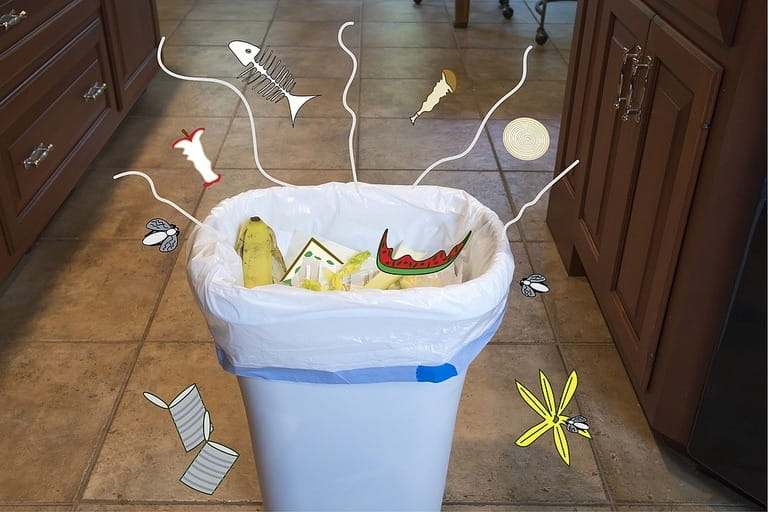That lingering, unpleasant smell in your kitchen isn't just frustrating — it's embarrassing, and no amount of cleaning seems to help. You've scrubbed the countertops, taken out the trash, and even aired out the space, yet the odor persists.
The truth is, there are hidden culprits that are easy to overlook, and unless you address them, the smell will keep coming back.
Let's uncover what's really causing that stubborn kitchen odor and, more importantly, how to get rid of it for good.
1. Garbage disposal

Over time, tiny food particles can become trapped in your waste-disposal unit. As they break down, they create unpleasant odors, especially if your waste includes chopping onions, garlic, or citrus. Grease, soap scum, and the growth of bacteria also play a role in this issue.
Solution
Clean garbage disposal with baking soda and vinegar
Source
To prevent this problem, you have to regularly rinse it with hot water to clear away any lingering waste. And when it needs a deeper clean, drain it with hot and soapy water.
For more stubborn clogs, try this: mix ½ cup of baking soda and ½ cup of vinegar, pour it down the disposal, and let it work its magic for an hour. Finally, rinse everything clean with water. Or grab a nylon brush and an all-purpose kitchen cleaner to give your system a thorough scrub.
2. Burnt food

Unlike the fresh and inviting scents of candles and essential oils, the smoke and odors from burnt food can easily cling to your furnishings and kitchen surfaces including cabinet, fabrics, walls, and even the air itself. Plus, this unpleasant odor can linger long after the initial mishap.
Solution

Boil vinegar
Source
Although the smell of burnt food can cling to the kitchen surfaces long, it's easy to remove it. As soon as the food burns, tackle the problem quickly before the odor has a chance to settle. To deodorize the unpleasant smell, you can boil vinegar or a simmer pot.
3. Poor ventilation

Cooking odors from frying, sauteing, and baking release smoke and strong-smelling compounds into the air. If your kitchen isn't well-ventilated, these odors get trapped and linger on surfaces such as curtains, walls, and furniture.
Solution

Simmering pot
Source
To help keep odors at bay, try opening windows or using range hoods and exhaust fans. If those aren't possible, natural solutions like simmering water with vinegar, citrus slices, or cinnamon and cloves can help neutralize strong smells.
For even better results, an air purifier with an activated carbon filter can reduce lingering odors during cooking.
4. Dishwasher

If you've been using your dishwasher for a while without giving it a good clean, it might start to smell. This can happen because of a dirty and clogged filter, food residue on the interior walls, mold and mildew growing on the gasket seal, and a clogged drain.
Solution

Remove and clean the filter
Source
These are the reasons why giving your dishwasher a deep clean is so important. Make sure to empty it out, remove and clean the filter so that you can clean the interior and gasket seals thoroughly.

Don't overstuff your dishwasher
To avoid a smelly dishwasher, clean the filter at least once a month to prevent food particles from building up. And don't overstuff the racks so that the water and soap can easily flow through the dishes and break down any debris.
5. Mold and mildew under the sink

Leaky pipes, cleaning product spills, high humidity, and garbage disposal leaks can create the perfect environment for mold and mildew to thrive under your sink. This often results in an unpleasant musty smell.
Solution

To cure mold and mildew in the kitchen, start by spraying white vinegar directly on the affected areas, letting it sit for an hour before scrubbing.
For tougher spots, mix baking soda with water to form a paste, apply it to the mold, and scrub after a few hours.
You can also spray a 3% hydrogen peroxide solution on the mold, allowing it to sit for 10-15 minutes before cleaning. These natural remedies effectively kill mold and mildew while being safe for most surfaces.
6. Refrigerator

If your food is not stored in airtight containers or if the seals aren't working well, smells can escape and spread throughout your fridge and freezer. This can be especially problematic with strong-smelling foods like onions and garlic as their odors can be absorbed by other foods.
Solution

The smells are invisible. So, once you've noticed them, it's time to empty out your refrigerator and freezer for a thorough cleaning. For the best results, make sure to clean the sides and back of the fridge too. Don't forget to wash removable shelves with mild soap and warm water.
7. Sink drains

Over time, your sink drain and pipes can build up food residue and organic matter such as fat and grease. As these substances break down, they form bacteria that release foul odors.
Solution

To quickly fix a smelly kitchen sink drain, just pour boiling water down the drain. It is a simple method, but very effective at dissolving and flushing away oil, grease, food particles, and bacteria.
Use baking soda and vinegar
Source
To tackle sink clogs, you try a mix of baking soda and vinegar. Start by pouring half a cup of baking soda down the drain, then follow it up with half a cup of white vinegar. Cover the drain and let it sit for a few minutes. This will create a fizzy reaction that breaks down debris and neutralizes odors.
Commercial drain cleaners
Source
For those really stubborn clogs, it's a good idea to invest in commercial drain cleaners. Their powerful enzymes and chemicals break down organic matter to eliminate odors. Just be sure to follow the manufacturer's instructions for the best effect.
8. Spills

Spills, whether it's liquid or food spills, can leave behind unpleasant odors if not cleaned up quickly and thoroughly. If your kitchen surfaces are made from porous and absorbent materials like unsealed wood, fabric, or certain types of wallpaper, cleaning up these spills can be a bit tricky. These materials tend to absorb and trap odors for a longer time.
Prevention

Go for Nonporous countertops
Source
Thus, to tackle spill problems, make sure to clean surfaces as soon as possible with the right cleaning products. To prevent spills, opt for non-porous and smooth surfaces such as stainless steel, sealed countertops which are better at resisting odors. These surfaces are easier to clean, helping you keep those persistent smells out of your kitchen.
9. Trash can

Even if the bag is regularly emptied, odors can stick to the inside of the trash can itself. Bacteria can thrive on the leftover liquids or food bits, creating long-lasting smells.
Solution

Choosing a smaller trash can instead of a big one can actually help you take out the trash more often. Since it fills up quicker, the garbage doesn't sit around as long. This means less time for stuff to rot and stink up the place.
However, like I said before, even after you take out the trash, the smell can stick around. So, be sure to give the inside of the trash can a good clean with warm water and soap. If you want to go the extra mile, try mixing water with vinegar or use a mild bleach solution (just 1 part bleach to 10 parts water).

Hide trash cans inside the kitchen cabinet
Another way to keep those bad smells under control is to put the trash can inside a kitchen cabinet or somewhere you can close it off. Or, just go for a trash can with a lid—it's an easy fix that helps block the smell so it doesn't hit you every time you walk by.












